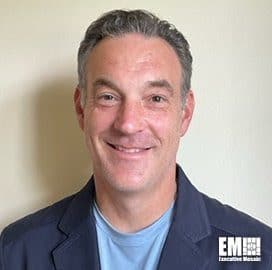
Portia Crowe
Chief Data Strategist
AFS, Defense
Member Profile: Portia Crowe, Chief Data Strategist for Defense at Accenture Federal Services
Portia Crowe, chief data strategist for defense at Accenture Federal Services, recently participated in an Executive Spotlight with the Potomac Officers Club to discuss her career path, the core pillars of her leadership style and what drives her forward as she serves government missions. Crowe came to AFS nearly two years ago after more than two decades of government service with the Department of Defense.
What can you tell us about your background and how you’ve been able to adapt to the ever-changing challenges of the federal landscape over the course of your career?
With a career spanning over 20 years as a dedicated government civilian, I have been fortunate to work on some challenging and innovative efforts with great teammates. My experience encompasses a range of roles, including serving as the chief data officer of the Network Cross-Functional Team at Army Futures Command. Throughout my journey, I have been honored to play key roles in shaping the future of the military to include supporting cutting-edge Army research and development and developing and deploying critical mission capabilities through the acquisitions process.
My time as a government civilian was an extraordinary journey of personal and professional growth, one that has given me the skills, knowledge and experience necessary to achieve success for my defense portfolio clients today. At every turn, I have taken on new challenges with determination, collaborated with colleagues and stakeholders to accomplish the mission that is laid out before us, and have always kept my deep commitment to our soldiers and our nation front-and-center.
I am proud of the impact that we made and continue to make as a team. I look forward to continuing to serve and make a difference in the years to come.
When did you decide to pursue a career in the federal landscape and what were the key tasks that you wanted to complete? Any bigger goals you still want to accomplish?
I chose to pursue a career in computer science and engineering after graduating from college. The community where I lived in New Jersey had a well-respected base, Fort Monmouth, that offered exciting work in a laboratory setting, with opportunities to be a part of innovative, exciting projects. I wasn’t familiar with the military when I graduated and I didn’t come from a military family, but I knew I wanted to serve our country, support our soldiers and strengthen our national security. For me, this was an opportunity to get outside my comfort zone and get hands-on experience while allowing me to raise a family. It was what started me off on a two-decade career at the Department of Defense, as well as prepared me for my current role as chief data strategist for defense at Accenture Federal Services.
At Accenture Federal Services, I have the unique advantage of merging the best of both worlds: the criticality of national security and utilizing our expansive resources. I love that I can engage and learn from our private sector clients and leverage it for the public sector. Moving from DOD to Accenture Federal Services was a smooth transition, as I was immediately welcomed into a supportive community whose values align with my own.
I continue to learn from those around me, create deeper partnerships and provide the best thought leadership and solutions to our clients. One goal that will always be on rotation is to continue to keep up with technological advances and apply deep thinking into how to apply them to solve our client’s complex challenges.
What do you believe are your core strengths as a leader and what lessons taught you the most about driving success?
As a leader, I believe my core strength is tenacity. I’m willing to work to get to ‘yes’ and I have a ‘let’s make it happen’ attitude. Sometimes it’s helping others to understand the ‘why’ or sometimes it’s creating and implementing solutions where security is a challenge. This quality has come in handy whether it is rapidly delivering capability to our soldiers or creating my own work/life balance. I believe challenging the status quo to find new and innovative ways to achieve success is important.
In my career, I have also learned that trust is critical for your teammates and senior leaders. When I earn their trust, they empower me to push the boundaries of what is possible and deliver results, even when faced with seemingly overwhelming obstacles. At the heart of what drives me is a focus on the mission.
What are the core values that you believe are essential to build a great team and establish a foundation to drive success in such a competitive industry?
Whether you’re in government or industry, building a great team and establishing a foundation for success requires a combination of two core values: a positive attitude and trust.
Positivity is a critical component in team building and success. Individuals who bring a positive attitude to their work create a supportive and solution-focused environment. I have been fortunate to have had great mentors and leaders in both the military and private sectors who have taught me the importance of approaching problems with a solution-focused mindset. I believe that a positive attitude fosters a can-do spirit, helps individuals navigate obstacles with greater ease and makes you the kind of person that other people want to work with.
Trust is another key value that plays a crucial role in team building and success. Teams that work well together are built on trust, and without trust in one’s team and leader, it becomes challenging or impossible to work towards a common goal effectively.
There are also certain values I have found to be embodied in the culture of DOD, and that directly translate to the private sector, including the principles of integrity, duty, respect and excellence. These values serve as a cornerstone for effective and efficient team building, and foster a human-centered approach, where positivity and trust play a crucial role.
If you were given free rein to enact changes in the federal landscape, what are the first three changes you would implement and why?
- Better feedback for contractors. What I didn’t know when I was a civilian is the amount of time and money it takes to prepare for client engagements, respond to RFIs and DRFPs. Feedback to industry is welcomed so we can adjust our position and propositions to best fit the client.
- Continue to promote self-education and incentives for our workforce to be skillful in areas like data and AI/ML so that we can take advantage of these great assets in military planning and projects.
- Leveraging lessons learned and experiences from our commercial clients. I would love to see more leaders leaning in and taking advantage of companies like Accenture that have hundreds of commercial clients that can provide a fresh perspective.
With emerging technology influencing the federal government and industry more by the day, what are some of the challenges on the business side of innovation that aren’t always discussed as often as they should be?
The importance of securing our data needs to be at the forefront. With the amount of sensitive data and information that AI systems collect and store, there is always a risk of data breaches, privacy violations and adversarial threats.
The risks and rewards of using emerging technology is a business case and can also be an ethical one as well. The pace of technological advancement can sometimes make it difficult to anticipate and address potential security risks, but it is imperative that we stay ahead of the curve and take the necessary measures to protect sensitive data and privacy.

Category: Executive Profiles




